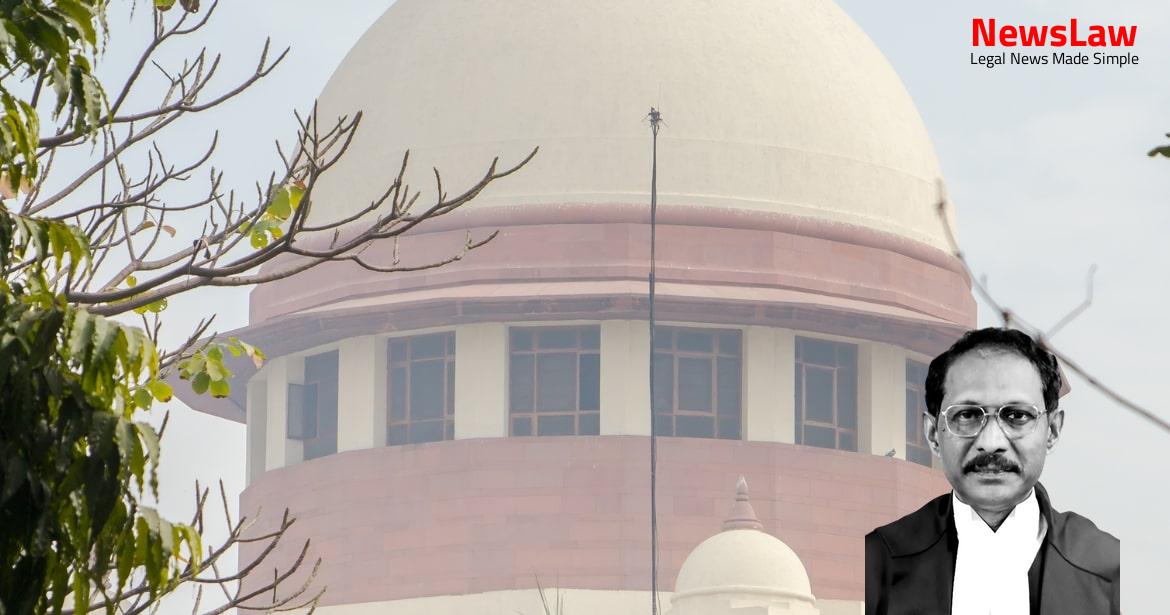Explore the intricate legal analysis by the court in a recent case focusing on a landlord-tenant dispute. The case delves deep into the interpretation of the Tenancy Act and the delineation of jurisdiction between Civil Courts and Revenue Courts. Understanding the statutory provisions and the court’s analysis is essential for grasping the resolution of such disputes. Stay tuned to unravel the complexities of landlord-tenant relationships under the legal framework.
Facts
- Mahant Ramji Dass, as the manager of the Mandir, did not have the power to sell the property, making the sale deed invalid.
- The first respondent was in possession as a tenant under the Mandir and not under the Mahant in an individual capacity.
- The eviction order was found to be null and void as it was without jurisdiction.
- The appellants were not entitled to protection under Section 116 of the Indian Evidence Act as there was no landlord-tenant relationship between them and the first respondent.
- The Trial Court decreed in favor of the first respondent, declaring the suit land to be owned by the Mandir.
- Mahant Ramji Dass sold the property to the appellants without having the title to it, leading to the dismissal of their appeal.
- The High Court upheld the findings of the lower courts and ruled that the suit was not barred by res judicata.
- It was established that Mahant Ramji Dass was only the manager of the Mandir and did not have the authority to alienate its property.
- No plea raised in the courts below regarding revenue court authorities deciding the question of title
- Legal proposition not disputed by counsel for appellants
- No evidence of first respondent paying rent to appellants or recognizing them as landlords
- Privity of contract not established
- Section 116 of Evidence Act applicable only to original landlord at the beginning of tenancy
- Tenancy of first respondent began with lease deed dated 20.10.1955 by General Attorney of Mahant Ramji Dass, Shri Balak Nath
Also Read: Legal Analysis: Tripartite Agreement and Liability under Consumer Protection Act
Issue
- The issue revolves around the interpretation of Section 25 of the Act.
- Section 25 of the Act states that the validity of any proceedings or order under the Act cannot be questioned in any court or authority except in accordance with the provisions of the Act.
- The appellants argue that the suit filed by the first respondent is barred based on this section.
- The only contention asserted by the appellants is regarding the bar under Section 25 of the Act.
Also Read: Land Acquisition for Public Welfare – Legal Analysis
Analysis
- The Revenue Court under Section 77 of the Tenancy Act is only entitled to pronounce on the relationship between the landlord and tenant for deciding disputes within its jurisdiction.
- The jurisdiction of the Revenue Court does not extend to pronouncing finally on the existence of the landlord-tenant relationship or any question of title between the parties.
- A serious dispute regarding the existence of the landlord-tenant relationship cannot be determined by the Revenue Court.
- Section 77(3) of the Tenancy Act confers exclusive power on the Revenue Court to decide specific disputes and ousts the jurisdiction of civil courts.
- A mere denial of the landlord-tenant relationship by either party does not oust the jurisdiction of the tribunals under the Act.
- Section 25 of the Act prohibits questioning the validity of any proceeding or order made under the Act in a civil court, except as per the provisions of the Act.
- The dispute subject to Section 7(1) must fall within specific categories related to possession and rights under the Act, without questioning the relationship between the parties.
- Civil courts retain jurisdiction to finally pronounce on the landlord-tenant relationship despite the bar under Section 77(3) of the Tenancy Act.
- Disputes regarding the existence of the landlord-tenant relationship cannot be bindingly decided by the Revenue Court and can be challenged in civil court.
- If there is a genuine dispute about the landlord-tenant relationship, the Civil Court retains jurisdiction to decide on the validity of orders passed under the Act.
- Section 14A of the Act provides the procedure for a landowner to eject a tenant under specific circumstances.
- Section 25 of the Act excludes the validity of any proceeding or order made under the Act from being questioned in any other court or authority.
- Section 42 outlines the limited cases in which a tenant can be ejected, such as arrears of rent or lack of occupancy rights.
- Sections 43, 44, and 45 further elaborate on the exceptional cases for ejectment mentioned in Section 42.
- Section 50A bars Civil Courts from entertaining suits regarding ejectment or possession disputes in certain situations.
- Sections 23 and 24 deal with the abrogation of pending decrees and the appeal process respectively.
- Sections 75, 76, and 77 delineate the roles of Revenue Courts, Revenue Officers, and the jurisdiction of Revenue Courts in specific suits or disputes.
- Section 77(3) specifies that certain suits must be heard and determined exclusively by Revenue Courts.
- The definitions of ‘Landowner’ and ‘Tenant’ are provided in Sections 2(1) and 16 respectively.
- Section 9 sets out the conditions under which a tenant may be ejected, including failure to pay rent regularly.
- The Act overall establishes a detailed framework for the relationship and disputes between landowners and tenants under specific circumstances.
- In Magiti Sasamal v. Pandab Bissoi, the Orissa Tenant Protection Act, 1948 was considered, specifically Section 7(1) of the Act.
- A series of Division Bench decisions such as Muni Lal v. Chandu Lal, Ambala Bus Syndicate (P) Ltd. v. M/s. Indra Motors Kurali, and J.G. Kohli v. Financial Commissioner Haryana were followed chronologically.
- Justice R.S. Sarkaria’s dissenting opinion in Amar Singh case explained the scope of the expression ‘except in accordance with the provisions of the Act’ with reference to Section 24 of the Act.
- The Court held that an order passed under Section 14A could be challenged through Appeal, Review, and Revision as provided in the Tenancy Act.
- The concept of res judicata was discussed in various cases, emphasizing the need for the proper resolution of disputes under the Tenancy Act.
- Instances where the denial of the landlord-tenant relationship led to civil court jurisdiction were highlighted in Om Prakash and other related cases.
- The doctrine of estoppel and election in contractual matters were explained and applied in the context of landlord-tenant disputes.
- Various High Court and Supreme Court judgments were referenced to illustrate the application of statutory provisions and jurisdiction in landlord-tenant disputes.
- The power to decide the existence of the landlord-tenant relationship cannot be assigned to the Authorities under the Act.
- The tenant claims to be a tenant under the Mandir, which has been found to be the owner of the property.
- The appellants claim under an assignment made by the Mahant, who has been found to be without authority to convey any right to the appellants.
- Even the case of the appellants is based on the failure to pay rent by the respondent-tenant.
Also Read: Legal Analysis of Interchange Fee Taxation Dispute
Decision
- The contention raised by the appellants is deemed meritless
- The Appeal will be dismissed as a result
- The parties involved are instructed to bear their own costs
Case Title: ASSA SINGH (D) BY LRS. Vs. SHANTI PARSHAD (D) BY LRS. . (2021 INSC 743)
Case Number: C.A. No.-006915-006915 / 2021



